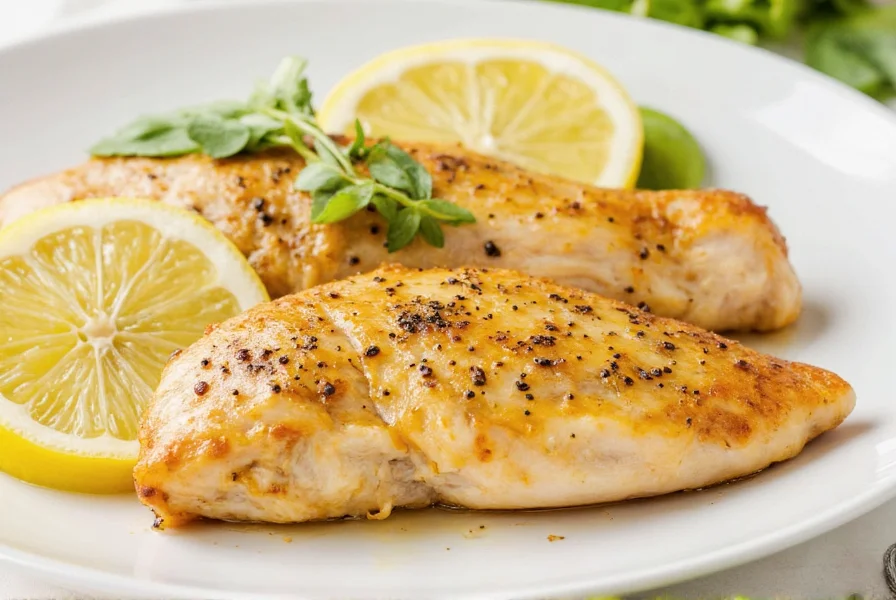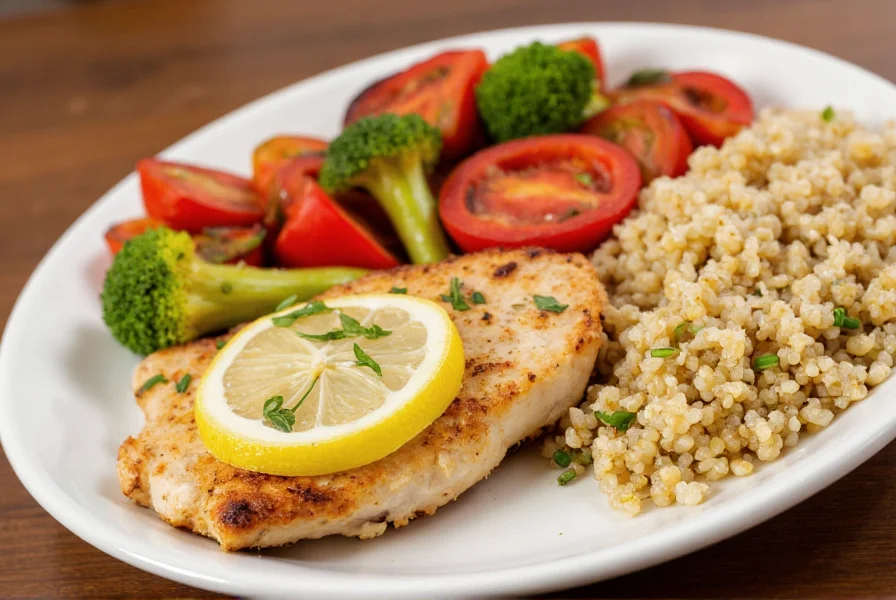Creating perfectly cooked lemon pepper chicken breast requires understanding the balance between citrus brightness and pepper's sharp warmth. This versatile protein option works for weeknight dinners, meal prep, and special occasions when prepared correctly. The key lies in proper seasoning technique, precise cooking temperature, and adequate resting time to maintain moisture.

Essential Ingredients for Flavorful Results
Quality ingredients form the foundation of exceptional lemon pepper chicken. For one serving, gather:
- 1 boneless, skinless chicken breast (6-8 ounces)
- 1½ tablespoons lemon pepper seasoning (check sodium content)
- 1 tablespoon fresh lemon juice
- 1 teaspoon olive oil or avocado oil
- ½ teaspoon garlic powder
- ¼ teaspoon onion powder
- Salt to taste (optional, as many lemon pepper blends contain salt)
Step-by-Step Cooking Method
Follow these professional techniques for restaurant-quality results at home:
- Prep the chicken: Place chicken breast between plastic wrap and gently pound to ½-inch thickness using a meat mallet. This ensures even cooking.
- Create flavor base: Combine lemon juice, garlic powder, and onion powder in small bowl. Rub mixture over chicken and let sit 10 minutes.
- Season properly: Pat chicken dry with paper towels, then apply lemon pepper seasoning evenly on both sides. Don't skip drying step—moisture prevents proper browning.
- Heat the pan: Preheat skillet over medium-high heat for 3-4 minutes until hot. Add oil and wait until shimmering but not smoking.
- Cook to precision: Place chicken in skillet and cook 5-6 minutes per side. Use instant-read thermometer to check internal temperature reaches 165°F (74°C) at thickest part.
- Rest before slicing: Transfer to cutting board, tent with foil, and rest 5 minutes. This allows juices to redistribute throughout the meat.
Avoiding Common Cooking Mistakes
Many home cooks encounter dry or bland lemon pepper chicken due to these preventable errors:
- Skipping the pound step: Uneven thickness causes overcooked thin sections while thick parts remain undercooked
- Using bottled lemon juice: Fresh lemon juice provides brighter flavor without preservatives found in bottled versions
- Cooking at wrong temperature: Too hot creates burnt exterior with raw interior; too low steams instead of sears
- Cutting immediately: Slicing before resting releases precious juices onto the cutting board
| Nutrient | Per Serving (6oz) | % Daily Value |
|---|---|---|
| Calories | 280 | 14% |
| Protein | 46g | 92% |
| Total Fat | 9g | 12% |
| Saturated Fat | 1.5g | 8% |
| Sodium | 420mg | 18% |
| Vitamin C | 12mg | 13% |
Variations for Different Dietary Needs
Adapt this basic lemon pepper chicken breast recipe for various preferences:
- Low-sodium version: Make your own lemon pepper blend using 2 tbsp lemon zest, 1 tbsp coarsely ground black pepper, 1 tsp dried thyme, and ½ tsp garlic powder
- Keto-friendly preparation: Increase healthy fats by finishing with 1 tbsp butter and fresh herbs during last minute of cooking
- Meal prep adaptation: Cook chicken slightly less (160°F), then finish heating when serving to prevent dryness after refrigeration
- Creamy sauce variation: After removing chicken, deglaze pan with ¼ cup chicken broth, then stir in 2 tbsp heavy cream and simmer until slightly thickened

Serving Suggestions and Pairings
Lemon pepper chicken breast complements numerous side dishes for complete meals:
- Classic pairing: Steamed asparagus with lemon wedges and roasted baby potatoes
- Light option: Mixed greens salad with avocado, cherry tomatoes, and balsamic vinaigrette
- Hearty meal: Quinoa pilaf with sautéed mushrooms and green beans
- Summer favorite: Grilled zucchini, bell peppers, and corn on the cob
Storage and Reheating Guidelines
Proper storage maintains quality when meal prepping lemon pepper chicken:
- Refrigerate within 2 hours of cooking in airtight container
- Consume within 3-4 days for best quality
- Reheat gently in skillet over medium-low heat with 1 tsp water to create steam
- Alternatively, microwave at 50% power in 30-second intervals until warmed through
- Freeze cooked chicken in portion-sized containers for up to 3 months
Frequently Asked Questions
How do I prevent lemon pepper chicken breast from drying out?
Prevent dryness by pounding chicken to even thickness, using a thermometer to remove at 160°F (it will rise to 165°F while resting), and always allowing 5 minutes of resting time before slicing. Marinating for 10-15 minutes in lemon juice and olive oil also helps retain moisture during cooking.
Can I use bottled lemon juice instead of fresh for lemon pepper chicken?
While possible, fresh lemon juice provides superior flavor without preservatives or metallic notes found in many bottled versions. Bottled juice often contains additives that can create a slightly bitter taste when cooked. For best results, always use freshly squeezed lemon juice when preparing lemon pepper chicken breast recipes.
What's the ideal internal temperature for cooked lemon pepper chicken breast?
The safe minimum internal temperature for chicken breast is 165°F (74°C) as measured by an instant-read thermometer at the thickest part. However, professional chefs often remove chicken at 160°F because carryover cooking during the 5-minute resting period will bring it to the safe 165°F temperature while preserving juiciness.
How long should I marinate chicken breast with lemon pepper seasoning?
For optimal results, marinate lemon pepper chicken breast for 10-15 minutes at room temperature. Longer marinating (over 30 minutes) with acidic ingredients like lemon juice can begin to break down the chicken's texture, making it mushy. If preparing in advance, store seasoned chicken in the refrigerator for up to 2 hours before cooking.
What's the best cooking method for lemon pepper chicken breast?
Pan-searing in a heavy skillet provides the best balance of flavor development and moisture retention for lemon pepper chicken breast. The direct heat creates a flavorful crust while precise temperature control prevents overcooking. Baking works well for multiple servings, while grilling adds smoky notes but requires careful monitoring to prevent drying.











 浙公网安备
33010002000092号
浙公网安备
33010002000092号 浙B2-20120091-4
浙B2-20120091-4